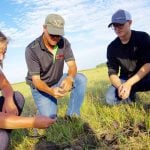Sandecki writes from Terrace, B.C. This column originally appeared in the Terrace Standard and was written after the late June Native day of protest across Canada.
In a news story or a biography, when you see the sentence, “He was born in a house without running water,” do you wonder why the writer drew attention to that detail? I do.
Is the writer implying that it’s unbelievable he amounted to anything after that uncivilized beginning? Or does the writer mean, “he should be proud he amounted to something despite growing up environmentally deprived”?
Read Also

Budget seen as fairly solid, but worrying cracks appear
The reaction from the agriculture industry to prime minister Mark Carney’s first budget handed down November 4th has been largely positive.
Doing without running water is inconvenient. Certainly it necessitates more work. But it doesn’t hold sway over a person’s lifetime accomplishments. Nor should it imply poverty.
Plenty of successful Canadians grew up in homes without running water: Pierre Berton, newspaperman, editor and author of dozens of books, born in Whitehorse, Yukon; James K. Bartleman, former ambassador and now lieutenant-governor of Ontario, born in Muskoka, Ont.; John Diefenbaker, former prime minister of Canada, born in Prince Albert, Sask.
The lack of running water never stood in the way of these peoples’ aspirations and achievements, nor mine.
I, too, grew up in Saskatchewan, in a farm house without running water. Our neighbours were no better off.
We felt no stigma for our pioneer lifestyle. In fact, the chore of hauling water inspired us to get an education so we could move on up. The chore also taught us many useful habits that served us well in later life.
Each household gained independence, planning ahead to have water when we needed it. On the other hand, storms couldn’t leave us high and dry the way hydro outages can today.
We learned to hang up our clothes to keep them clean and unwrinkled so they could be worn more than once. Inadvertently, we were rationing the amount of soap phosphates hurting the environment even before environmentalist David Suzuki graduated from high school.
By washing up every morning in a basin of water and bathing once a week in a galvanized washtub filled with no more than two pailfuls of water, we kept ourselves clean and presentable. A cup of water was ample for teeth brushing.
States one government report: “Water consumption went up at least 20 times when pipes and pumps were introduced.”Â
Today’s average water use in the United States and Canada is 183 gallons per person per day. People would use far less water if they had to haul it a bucket at a time.
The effort that went into fetching a pail of water encouraged recycling. The kitchen floor was washed with dishwater before sloshing the irises and gladioli.
Procuring water provided hours of free, intentional exercise, hoisting pails from a 30-foot-deep well using a rope over a pulley, carrying the water sometimes a long distance. We made do without a gym or spandex.
For drinking or cooking, we pumped water from a first-class well Grandpa had dug in the basement below the kitchen and cribbed with concrete.
Otherwise, depending upon the season, water for other purposes had to be hauled in by the pailful from an outdoor well, a soft water tank that collected rainwater from the roof, or as snow to be melted in a tub on the woodstove.
Ontario’s lieutenant governor, a member of the Mnjikaning First Nation, grew up in poverty but his family’s lack of plumbing didn’t wash as an excuse with his mother. She insisted that he do well in school and go on to higher learning.
Running water can’t sculpt scholars from dropouts or tradespeople from drifters. Yet grand chief Phil Fontaine drums on Native poverty, especially the lack of running water, ignoring the responsibility of reserves and individuals to lift themselves above their parched existence.














